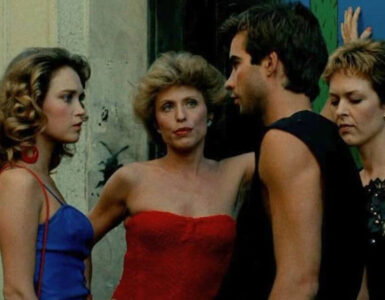It’s not rare that the film world attempts to adapt a beloved piece of literature for the big screen. Be it impending releases like ‘˜Les Miserables,’ or, say, the entirety of Stanley Kubrick’s career, cinema is the rare medium where adapting is not only supported, but with a Best Adapted Screenplay Oscar awarded yearly, deemed as awards worthy by the highest entity in the art form. However, one author whose work hasn’t been filmed all that often is cult Japanese scribe and beloved novelist Haruki Murakami.
That is, until now.
Equally beloved filmmaker Tran Anh Hung has adapted (he both wrote and directed the film) Murakami’s most well known piece, his romance tome ‘˜Norwegian Wood,’ and while it’s a story that has been looked at for quite some time as a possible film, we couldn’t have hoped for a better film than this gem put to celluloid.
‘˜Norwegian Wood’ follows the story of Toru Watanabe. A rather introspective young man living in 1960s Tokyo, he not only deals with the death of a dear and close friend, but also meets a pair of young women, one the depressed ex-beau of the recently passed right hand man, and the other a fellow student who couldn’t be any more opposite to Toru’s passive lead. A tale of loss, and how human beings deal with the outcome of loss, ‘˜Wood’ is a beautiful piece of cinema that couldn’t be a better way to start off the new year.
As a film, this piece doesn’t really seem to fit that bill. Narratively, ‘˜Wood’ jumps from one vignette (say a long single shot of our two main leads having a moving confrontation in a field) to Toru and Midori speaking at a pool. This style, while distinctly lyrical and intentionally poem-like, does not feature the strongest of character arcs, nor the wide reaching look into an intimate relationship that Murakami’s novels are best known for. However, what the films do get perfectly is the moving core that makes Murakami the go-to writer for those looking for an intimate tale of isolation, loss and love.
Hung uses long, single take sequences to weave this narrative together like the most poetic of seamstresses, setting a world that seems as melancholic as its inhabitants. With stunning cinematography, Hung is able to ring out of this film so much pure and visceral emotion, that it feels as though he could do it blindfolded. With top tier performances surrounding the film from the trio of Kenichi Matsuyama, Rinko Kikuchi and Kikio Mizuhara, the film is as potent a piece of filmmaking as Murakami’s novel is a piece of writing, if a little broader and seemingly overlooking of many moments the novel had to offer. Kikuchi is specifically haunting, as the troubled Naoko, and while the character’s mood swings from second to second, the ability to switch emotions on a dime is something that makes this performance so breathtaking. Kikuchi has a face so perfect to watch emotion play off of, that the film ultimately leaves the viewer a wholly broken person. Just a real moving piece of filmmaking.
With a score from Radiohead guitarist Jonny Greenwood playing the crescendos of the film’s emotional core like a maestro, ‘˜Norwegian Wood’ is a devastating piece of filmmaking from one of today’s most interesting directors. Based on a brilliant novel from Haruki Murakami, the source material may be a dense and tough piece to make into a feature, but instead of going the easy route, Hung not only makes a great adaptation, but evokes pure, true blue emotion from those who sit in front of it. Simply put, it’s the first true must-see film of 2012.






![Bergman Island (The Criterion Collection) [Blu-ray]](https://criterioncast.com/wp-content/uploads/2022/11/bergman-island-the-criterion-collection-blu-ray-400x496.jpg)
![This Is Not a Burial, It’s a Resurrection (The Criterion Collection) [Blu-ray]](https://criterioncast.com/wp-content/uploads/2022/11/this-is-not-a-burial-its-a-resurrection-the-criterion-collection-blu-ray-400x496.jpg)
![Lars von Trier's Europe Trilogy (The Criterion Collection) [The Element of Crime/Epidemic/Europa] [Blu-ray]](https://criterioncast.com/wp-content/uploads/2022/11/lars-von-triers-europe-trilogy-the-criterion-collection-the-element-of-400x496.jpg)
![Imitation of Life (The Criterion Collection) [Blu-ray]](https://criterioncast.com/wp-content/uploads/2022/11/imitation-of-life-the-criterion-collection-blu-ray-400x496.jpg)
![The Adventures of Baron Munchausen (The Criterion Collection) [4K UHD]](https://criterioncast.com/wp-content/uploads/2022/11/the-adventures-of-baron-munchausen-the-criterion-collection-4k-uhd-400x496.jpg)
![Cooley High [Criterion Collection] [Blu-ray] [1975]](https://criterioncast.com/wp-content/uploads/2022/11/cooley-high-criterion-collection-blu-ray-1975-400x496.jpg)